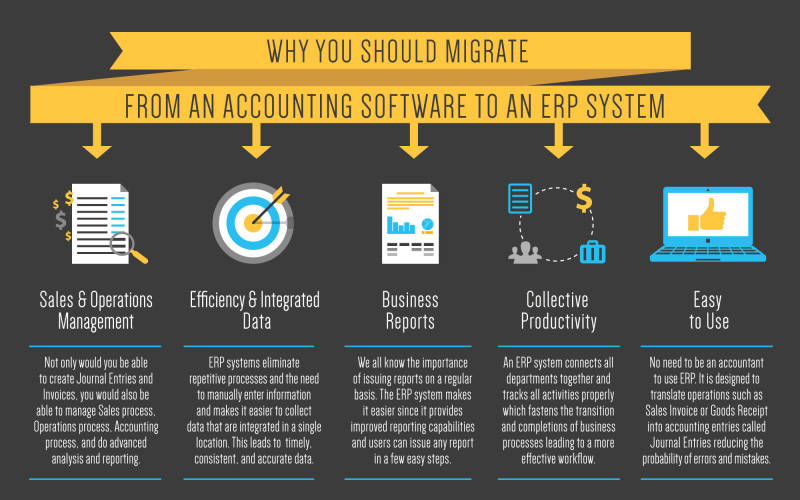As Companies and Businesses become more demanding, interactive and difficult to administer, the need for a revolutionary business management software became higher than ever. Although many businesses tried to hold on to Accounting Software in the past, the birth of Enterprise Resource Planning (ERP) systems led to a huge change in the equation. To begin with, Accounting Software signifies a sort of application software that documents and operates accounting transactions, and whose functionality differs with the difference of the product; it covers functions such as char of accounts (COA), journal entries, account receivable/payable, invoicing, and accounting reports... which proved to be very efficient in the past, however, The Enterprise Resource Planning System is connected to business process management. It lets organizations use networks of coherent applications in order to manage businesses and automate back-office tasks and functions related to services, technology and human resources such as people, materials, operations, tasks, and financial resources, which proves to be the most efficient nowadays. Therefore, Accounting Software System and ERP Software System are not equivalent to each other, on the contrary, they differ a lot technically, which is what we are about to see below.
ERP Software System vs. Accounting Software System
Firstly, both systems are meant to do the same job, nevertheless, Accounting Software fails to meet the bars set by the ERP Software which not only covers all the financial aspects of a business, but also those that might have an impact on the company's finances, hence being essential to its accounting. Therefore, it is safe to say that Accounting Software is a small part of ERP Systems which grant the following functionalities and features:
- Sales and Operations Management
Other than warranting the ability to create Journal Entries and Invoices, the ERP Software System helps you manage Sales processes, Operations processes, accounting processes, and conduct advanced analysis and reporting.
PHASE | PHASE 1: SALES PROCESS | PHASE 2: OPERATIONS PROCESS | PHASE 3: ACCOUNTING PROCESS | PHASE 4: ANALYSIS |
Activities |
|
|
|
|
Accounting software | No | Only invoicing | Yes | Only accounting reports |
ERP | Yes | Yes | Yes, automated JEs | Yes |
- Efficiency and Integrated Data
Eliminating all repetitive and manual processes, the ERP system provides a great level of accuracy and efficiency, making it easier for the company to collect data integrated in a single location, which leads to a timely, consistent, and accurate outcome at all times.
- Business Reports
Planning and foreseeing future losses or gains are essential to a company's success or failure, hence the importance of reports, however, that does not make them less annoying. The ERP System facilitates the entire process, making it customizable by providing better reporting functionalities so that the time-consuming reports are a few simple steps away. An example would be a report showing items sold, delivered, and not paid.
- Collective Productivity
With ERP System, data sharing is made simple and all information are accessible to different users at the same time. It also unifies all departments, tracks all activities, and fastens the transition and completion of any business process, naturally leading to a more effective workflow.
- Decision Making process
While firms and companies grow, they become more complex and diversified, and people in charge, being a part of the project, are overwhelmed with its growth and success to the extent of not being able to judge objectively or even grasp the entire picture. Too much is going on for a person to assimilate. The ERP System goes beyond simple accounting into predicting future losses and profits, changing market trends, greater opportunities, ways of increasing profit margins, lowering production cost, improving the quality of the product, identifying new markets... thus helping in the decision making process more efficiently than any person in charge.
- User Experience
The ERP System was created by an accountant for all people, which implies an extremely easy-to-use system. It is so practical that it prevents users from making errors by automating accounting entries, it also serves to translate operations like Sales Invoice or Good Receipt into accounting entries.
In the age of technology and information, consumerism and never-ending shifting of trends; carefulness, attention to detail, and good decision making are essential for a company's success. These can be achieved through accurate reports, trustworthy predictions and a bold shift from the old to the new. Consider the difference between Classicism and Impressionism in painting, although one seems more accurate and more true to life, the impressionist painting not only pictures life, but exceeds it into something bigger and more realistic, which is the correlation between the environment and the nature as seen by the human eye. This is the difference between Accounting software and ERP system, the first tries to deliver accuracy, but the second transcends it into unveiling the relation between the numbers and the market thus being more efficient, more insightful and more professional in that it does not only explain how business is going, but can also suggest how to run it better.

